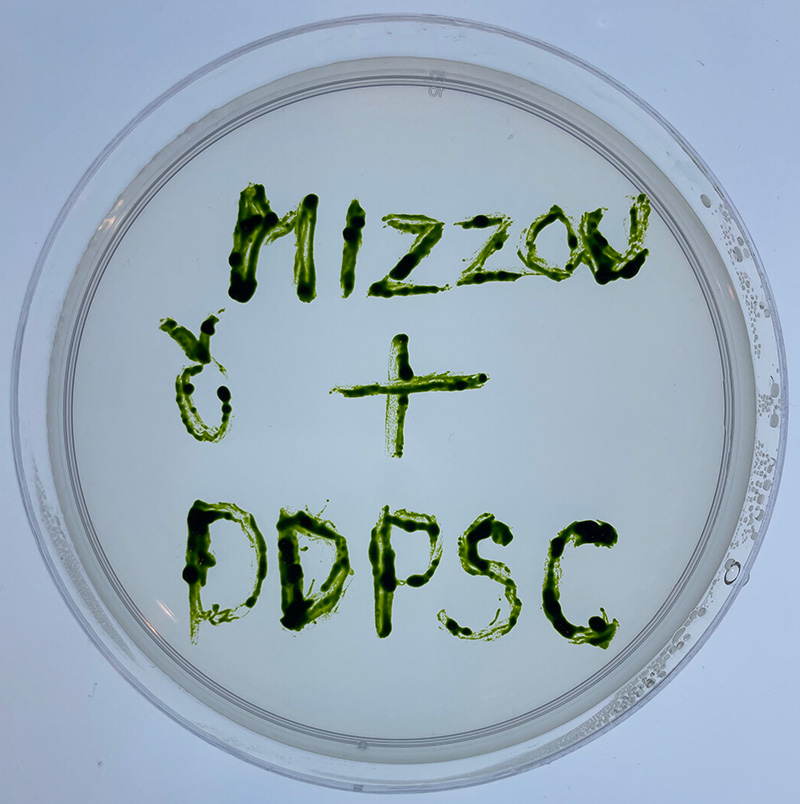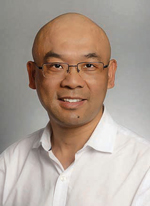Columbia, Missouri, USA
March 6, 2023
 Researchers in the Zhang Lab at Danforth Plant Science Center grew this algae to highlight their partnership with Mizzou. On the left is a representation of an individual Chlamydomonas cell. Image courtesy of Erin Mattoon.
Researchers in the Zhang Lab at Danforth Plant Science Center grew this algae to highlight their partnership with Mizzou. On the left is a representation of an individual Chlamydomonas cell. Image courtesy of Erin Mattoon.
An inter-institutional research team is using the power of computational analysis to pinpoint which plant genes confer resilience against rising temperatures that threaten global food supplies in the coming decades.
Mizzou Engineering Professor Jianlin “Jack” Cheng — one of the first scientists in the world to use deep learning, a powerful artificial intelligence technique, to predict protein structures — adds a unique perspective to the work. Since 2018, he’s been collaborating with Dr. Ru Zhang, a plant scientist at the Danforth Plant Science Center in St. Louis, to leverage computational tools in the study of plant genes.
“I’ve been studying protein structure prediction for 20 years, and we can finally see the significant impact it can have on research being done by biologists and other scientists to solve real-world problems,” Cheng said. “Historically, plant scientists rarely used protein structures in their research, so it’s exciting that Ru is among the first group of pioneers starting to bring protein structures into traditional biological research.”

Jianlin “Jack” Cheng
Proteins are complex molecules essential for life. The way a protein folds into a three-dimensional structure determines its function, however, predicting that shape is challenging, as there are millions of possible configurations.
Cheng is William and Nancy Thompson Distinguished Professor of Electrical Engineering and Computer Science. His deep learning techniques consistently ranked among the top methods in the last six rounds of the biennial community-wide Critical Assessment of Techniques for Protein Structure Prediction (CASP) from 2012 to 2022.
Zhang’s lab studies how plants respond to heat and other environmental stresses—and knowing how proteins in plants behave is critical to her ultimate goal of designing plants that can survive climate change.
In their latest joint paper, published in Plant, Cell & Environment, Cheng and Zhang, along with lead author Erin Mattoon, provide targets for engineering heat-tolerant plants. Using a type of green algae called Chlamydomonas, the team determined which genes are required for plants to grow under high temperatures.
“We’re basically systematically taking tools away from cells and seeing if they can still do their job,” said Mattoon, a Zhang-Lab PhD student from the Washington University in St. Louis. “By breaking those genes and then exposing the modified algal cells to high temperatures, we can see which modified algal cells are no longer able to grow, then we will know which disrupted genes are required for thermotolerance. We are interested in seeing how our list of genes we generated fit into a larger scope of other kinds of stresses and growth conditions, and that’s where the Cheng lab comes in, to contextualize how those genes and their proteins behave.”
On the flip side, Zhang’s team can validate Cheng’s computational predictions, Zhang said.
“I’m a big fan of Jianlin’s protein structure prediction,” she said. “The beauty is we can validate those predictions in the lab by using the alga Chlamydomonas as a model.”
Interested in using computer science to solve real-world problems? Learn more about electrical engineering and computer science at Mizzou.